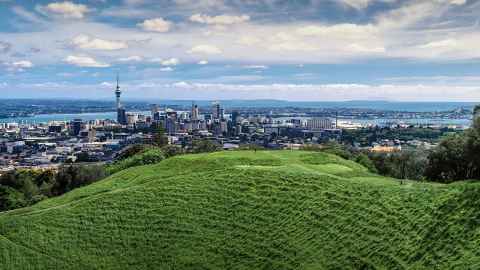Covid and ethnicity: ‘a difficult balancing act’
24 August 2020
Opinion: There’s been much debate about identifying the ethnicity of the Pacific family at the centre of the new Covid-19 outbreak. Dr Collin Tukuitonga explains why he thinks that decision was, on balance, the right call.

Identifying the ethnic origins of the first case of Covid-19 in the Auckland cluster has caused debate in the Pacific community and beyond.
Many believe that identifying the ethnicity of the cases serves no useful public health or clinical purpose – and, in particular, that identifying them as Pacific people will aggravate longstanding racist and discriminatory views and serve to further victimise the affected families and Pacific people more broadly.
There was also a risk that the release of ethnic information could inadvertently lead to identifying the cases and compromising their privacy.
On the other hand, those who’ve been delivering public health services, social support, contact tracing, and information about the cluster, have supported releasing the ethnic identity of the new Covid-19 cases.
They believe that specific ethnic information improves our ability to target services, and to advise the government on what the most appropriate action might be. Detailed information about the characteristics of the cases also helps to improve information flow and empowers Pacific individuals, families and communities.
It’s a difficult balancing act. There’s always a tension between the need to protect the privacy of affected individuals and the wider public interest.
Predictably, we’ve seen damaging racist views vilifying Pacific communities on mainstream and social media since the family at the centre of the Auckland cluster was first identified as Pacific — and that’s been aggravated by conspiracy theories about the origins of the disease.
I was one of those consulted about whether we should identify the ethnicity of the Auckland family. My advice to health officials was not to identify the specific Island group, although I reluctantly agreed to identifying them as Pacific people for public health reasons.
This, I thought, was a reasonable compromise, given the need to alert the Pacific communities to the change in their risk of contracting Covid-19. Ultimately, I believed it would save lives.
In the initial stages of the Covid-19 pandemic in Aotearoa New Zealand, Pacific people were under-represented in the cases reported. We made up 5 percent of the cases in the first wave. This was largely because most of the cases in the early stages of the pandemic were Pākehā returning from overseas.
So there was a risk this time that Pacific people would continue to believe that they were at lower risk. In fact, several media releases continued to refer to Pacific as low risk.
The Auckland cluster was clearly a change and most of the cases reported were Pacific. Of the 92 infected at the time of writing, 69 (75 percent) are Pacific and 12 (13 percent) are Māori.
In many ways, our fear of widespread community transmission appears to be justified. Housing and other adverse socioeconomic problems, along with a high prevalence of other health issues (such as diabetes and heart disease), have combined to increase the risk of infection and death in Pacific people.
The absence of critical information about the natural history of the disease has made it necessary for health officials to adopt a precautionary approach. This has meant that decisions have needed to be made without all the necessary information.
The decision to release ethnic information was strengthened by the desire of health officials to identify the suburbs where the cases lived, their place of work, and the schools attended by the children, in order to help with contact tracing.
But releasing geographic information and the ethnicity of the cases at the same time further compromised our ability to protect the identity of the affected families — especially as there was already speculation and rumour in social media platforms about the cluster and likely ethnicity of the cases. This situation clearly demonstrated the need for official information to be released promptly before social media speculation became fact.
It’s important to note that the Ministry of Health has been reporting the ethnicity (Māori, Pacific, European) of all Covid-19 cases since the beginning of the pandemic. The information on the number of cases from each of the ethnic groups has been readily available on the ministry’s website and it had caused no concerns.
Also, we routinely identify the ethnicity of people who are treated in the New Zealand health system. In fact, identifying ethnicity is widely practised in all interactions between individuals and government agencies. The difference here was that Covid-19 was a new threat and reported to be highly infectious with a risk of death.
So, while my advice to release ethnic information about the cases as “Pacific” was consistent with existing practice, I knew that the nature of the outbreak would set off racist responses and vitriol directed at the family and the wider Pacific communities. It was unavoidable. And, indeed, our fears of a backlash against the family and Pacific communities have proved to be justified.
But, while some Pacific people have disagreed with the release of ethnic information about the cluster, I think most have understood the need to share as much information as possible with Pacific families, communities, and our healthcare and social service providers.
Informed communities are empowered communities. I’m encouraged by the response from Pacific communities and leaders in working together to eliminate Covid-19 from our nation.
Dr Collin Tukuitonga is the inaugural Associate Dean (Pacific) in the Faculty of Medical and Health Sciences.
This article reflects the opinion of the author and not necessarily the views of the University of Auckland.
Used with permission from E-Tangata, Covid and ethnicity — ‘a difficult balancing act’, 23 August 2020.
Media contact
Paul Panckhurst | Media adviser
Mob: 022 032 8475
Email: paul.panckhurst@auckland.ac.nz